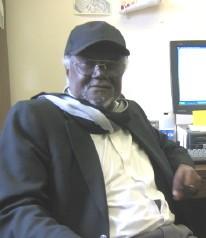In Memoriam
Aziz Batran, 1941-2011
Born in Sudan on November 18, 1941, Aziz Batran obtained a B. SC. (Hons.) from the University of Karthoum, Sudan, in 1964. In 1964, he obtained a Diploma in West African Studies (with distinction) from the University of Birmingham, UK. He completed a PhD in African History in the Centre of West African Studies, University of Birmingham, UK, in 1972.
His PhD dissertation “Sīdī al-Muk̳h̳tār al-Kuntī and the recrudescence of Islam in the Western Sahara and the Middle Niger, c. 1750-1811” was supervised by Africanist historian and Brazilian-born Paulo Fernando de Moraes Farias, a specialist of on Timbuktu and Songhay. Aziz Batran was the first PhD advisee of Professor Farias, who succeeded Professor John Ralph Willis at the University of Birmingham in 1969, when the latter moved to University of California-Berkeley.
Professor Farias recalls that Batran's PhD dissertation, was "an innovative study that still today was not surpassed or rivaled." Professor Farias also adds that the modified version of the dissertationThe Qadiryya brotherhood in West Africa and the Western Sahara the life and times of Shaykh al-Mukhtar al-Kunti, (1729-1811) published in 2001 by the Institut des Études Africaines (Université Mohammed V), "does not make full justice to Batran's work, neither to the practical difficulties he had to overcome during his fieldwork, nor to the original elements brought to light by his research."
Aziz Batran became a specialist of the history of West and North Africa as well as Islam in Africa. His area of interest was the spread of Islam and Sufi Brotherhoods in North and West Africa. He studied the role of these brotherhoods in consolidating the religious, cultural and economic unity of West and North Africa. In 1972-1973 he was a lecturer at University of California, Santa Cruz, then between 1973 and 1976, he was an Assistant Professor at Kenyatta University, Nairobi.
Between 1976 and 1977, Aziz Batran was a Research Professor at Princeton University where he joined renowned Africanist scholars, including John Ralph Willis (1938-2007). In 1976, Professor Batran joined the Department of History at Howard University, where he taught graduate and undergraduate courses in African history for 35 years. Over the years spent at Howard, he supervised dozens of PhD dissertations and MA thesis.
Professor Batran has published widely in a number of themes in African history, especially on the history of Islam. His books included: Tobacco Smoking Under Islamic Law (2003); The Qadiryya Brotherhood in West Africa and the Western Sahara (2001), Islam and Revolution in Africa (1984), Battle Over Tobacco-Smoking Between African Muslim Scholars (in Arabic, 1995), and The Turbaned Junta of Sudan: Manipulation of Song and Music (1997).
His most recent book Tobacco Smoking Under Islamic Law (2003) was praised by scholars like John Ralph Willis, according to whom the book offered "fertile ground for comparative study in the areas of law and religious history."
Aziz Batran’s articles appeared in the Journal of the Historical Society of Nigeria,The Journal of African History, Majallat Al-Bohouth and The Transafrican Journal of History. Other essays were also published in volumes entitled Studies in West African Islam (John R. Willis ed., 1979), Slaves and Slavery in Muslim Africa, Vol. 2 (John R. Willis, ed., 1985), Fes et l'Afrique (Morocco: Institut des Études Africaines, 1996), and UNESCO General History of Africa, Vol. VI (Ade Ajayi ed., 1989).
Aziz Batran appeared frequently on television, especially on WETA in Washington, D.C., as well as in the African and European media. He was also a consultant to and board member of several academic and cultural centers and organizations.
As a colleague, Aziz Batran enjoyed drinking good and strong coffee, discussing international politics, and talking about soccer. He always brought joy to his colleagues and students of the Department of history who had the pleasure and privilege to be in contact with him.
Aziz Batran is survived by his lovely wife, the great Sudanese singer Hadia Talssam, a member of the group Al Balabil, as well as two sons Omar Batran and Nassir Batran.
Selwyn Carrington, 1937-2018
Selwyn H. H. Carrington attended Concordia (Sir George Williams) University, in Montreal, Canada, from which he graduated with a B.A, in History and English. He then graduated with the M.A. in American History from the University of Manitoba, Winnipeg, Canada.
On completion in 1970, he attended Queen Mary College, University of London, where he studied for the Ph.D. in Imperial History, graduating in 1975. His thesis was entitled "Economic and Political Developments in the British West Indies during the American Revolution."
Professor Carrington lectured at St. Augustine Campus, the University of the West Indies, where he was a Senior Lecturer in Caribbean Economic and United States History.
In 1994, he joined the faculty of the department at Howard University as Visiting Professor in Caribbean History. In 1995-1996, he returned to Trinidad where he planned and executed a conference on "Capitalism and Slavery Fifty Years Later: Eric E. Williams and the Modern Caribbean." He returned to Howard University in 1996 to take up a full time appointment in Caribbean history. His areas of specialization were Caribbean history, the Black Diaspora and the history of the United States.
His research and publications include the books:
- Saunders, Ivan J., Rostecki, R.R. and Carrington, Selwyn H. H., "Early Building in Winnipeg." Manuscript Report No. 389, (Park Canada,1979) 7 Vols.;
- The British West Indies During the American Revolution (Leiden: Brill, 1988);
- Capitalism and Slavery Fifty Years Later: Eric Eustace Williams-A Reassessment of the Man and His Work, co-authored with Heather Cateau (Peter Lang Publishing, 2000), and
- The Sugar Industry and the Abolition of Slave Trade (1775-1810) (University Press of Florida, 2002).
He was also the author of dozens of articles and chapters. Dr. Carrington supervised more than 20 Ph. D. and M.A. dissertations, and many others are in progress. As a historian, Dr. Carrington also greatly contributed to the achievement of the African Burial Ground Project.
Emory Tolbert, 1946-2022
Dr. Emory Joel Tolbert served as chairman of the Howard University History Department from 1991 to 1998 and from 2002 to 2005. He held a Ph.D. from UCLA in United States History and has taught at UC San Diego, San Diego State University, and California State University at Fullerton, where he was a Professor of History and Chairman of the African American and Ethnic Studies Department. He specialized in the history of the United States, African American History and the history of the African Diaspora. Dr. Tolbert was the author of the first regional study of the Marcus Garvey Movement, entitled The UNIA and Black Los Angeles: Ideology and Community in the American Garvey Movement (Center for Afro-American Studies, UCLA, 1981). He was also senior editor of the Marcus Garvey and Universal Negro Improvement Association Papers, Volumes 1-4 (University of California Press, 1983-86). His other publications include Race and Culture in America: Readings in Racial and Ethnic Relations (Burgess Press, 1986, 1987, and 1988), and Perspectives on the African Diaspora, Volumes 1 and 2 (Houghton Mifflin, 1998 and 2001). His latest book was 2000 Years of Christianity in Africa, published by the Review and Herald Publishing Company in 2005. His articles included "Outpost Garveyism and the UNIA Rank and File" in the Journal of Black Studies (1973) and "Slaves, Workers and Race Rebels" in the Journal of American Ethnic History; "Federal Surveillance of Marcus Garvey and the UNIA" was published in the Journal of Ethnic Studies in 1987. His article "Marcus Garvey" was published in A Companion to American Thought (Blackwell, 1995).Dr. Tolbert teaches courses in United States History, African Diaspora History, and Oral History.
Dr. Tolbert passed away on October 4, 2022, when he was still teaching his beloved Howard University students.


